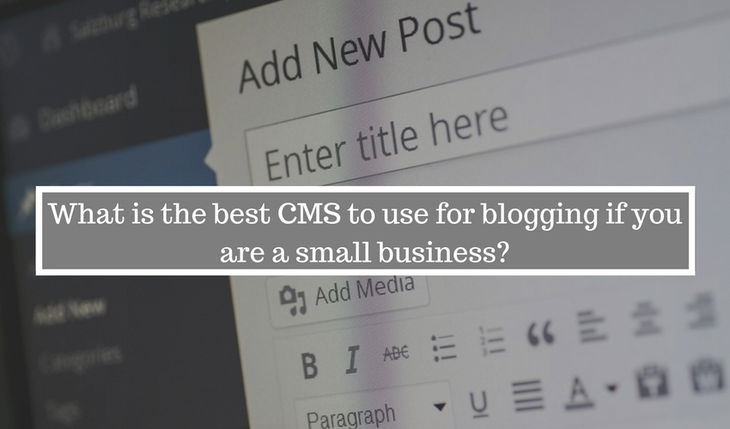Are you a small business that’s new to the blogosphere? If you’re considering starting your own blog, you’ll want to find out the best CMS (Content Management System) to use for your business.
It can be difficult to choose, especially as there are various different blogging platforms available.
’’Surely they all do the same thing, right?’’ Not quite! Whilst a CMS’s primary function is to allow you to create, manage and publish your content, they all have their own individual features, tricks, pros and cons.
The CMS you use for blogging also depends on your own personal aims and objectives for your blog. So, a CMS which may be perfect for one business, may be absolutely inadequate for your business.
Some things to consider when choosing the best CMS to use for blogging:
- How quick and easy is it to set up? (requires no or minimal coding skills).
- The cost.
- The style and design you want.
- What features you want to add to your blog.
- Will it allow you to create a mobile friendly web design?
So, how can you find out which blogging platform is best for your small business?
We’ll help you make the decision by running through some of the most popular CMS’ available for small businesses.
WordPress is by far the most popular CMS in use online. In fact, there are more than 75 million live WordPress sites floating about on the World Wide Web, and that number is rising everyday.
Note: It’s important to differentiate between WordPress.org and WordPress.com.
WordPress.org allows you to build your own website or blog, as it’s an open source platform. Due to being a self-hosted software, you will need to sign up with a reliable and fast WordPress hosting provider.
If you want your blog to eventually turn your small business into being serious and viable, WordPress.org is best, as you get your own domain name and own hosting. It may be worth investing in a WordPress web design agency, once your blog has started taking you off, It’s free to download – all you have to pay for is the domain and hosting. This will only set you back a few quid each month.
As your content matures, many small businesses also consider expanding their website to include eCommerce capabilities, digital product sales, or membership platforms.
In such cases, collaborating with development partners offering WooCommerce Development Services or broader WordPress customization, plugin integration, and performance optimization can help scale your site with minimal disruption.
WooCommerce is particularly popular due to its native compatibility with WordPress and flexibility for tailored storefront experiences.
Pros
- Discover your ideal domain and hosting.
- Full control over every part of your website.
- Easy to use and manage.
- Thousands of free and premium themes to design your website.
- Access to over 40,000 free plugins – these are additional features that can be added to your site.
- SEO Friendly.
- Can make mobile-friendly sites and apps.
Cons
- You’ll have to learn how to manage an entire website.
- You’ll be responsible for managing backups and security.
WordPress.com is a blog hosting service and offers a basic blogging platform for free. You can upgrade to a paid service, which can include additional features such as a custom domain name, more storage and getting rid of WordPress ads. WordPress.com is actually best for those starting up a blog as a casual hobby or student project.
Pros
- Easy to set up, use and manage.
- Free to use (if opting for the basic plan).
- Hundreds of free themes to choose from to customize your site.
Cons
- You’re limited in options and features to add to your site.
- Cannot run advertisements.
- You do not own your blog.
- WordPress.com can suspend your account if you violate the terms of use.
Weebly is a hosted CMS platform which allows you to build a website / blog for your small business by using drag-and-drop tools. There are a variety of themes available that can be customized. It’s free to use if choosing the basic plan.
Pros
- The drag-and-drop website builder is easy to use, with no technical skills required.
- Create unlimited pages.
- Host the site for free (can upgrade to paid plans).
Cons
- Limited to the number of built-in features you can use.
- Difficult to migrate your site over to a new CMS platform.
- Cannot add new features.
Wix is a hosted platform which features a drag-and-drop website builder. You can create free blogs and sites on their basic plan. Choose from many available themes for your small business and get customizing.
Pros
- Easy to setup and manage.
- Drag-and-drop tools mean no coding skills are required.
- Customize your site using the many different templates and themes available.
- Third party apps are available to use.
- Free to use (can upgrade).
Cons
- Limited to the features and add ons using the free version.
- You cannot change a template after you’ve chosen one.
- Wix branding and ads appear on your site on the free version.
Blogger is a free blog-publishing platform. It’s quick and easy to setup, use and manage.
Pros
- Free to use.
- Easy to setup and publish posts (no need for technical skills).
- Hosted by Google and so is a secure platform.
Cons
- Limited to basic tools and features.
- Limited to the number of design themes and templates available.
- Google can suspend your account at any time.
Squarespace is one of the best website builder that uses drag-and-drop tools.
There are variety of premium themes to use to create beautiful looking sites. This is the best CMS for small businesses and bloggers focused on the aesthetics of their site.
Pros
- Simple to use with drop-and-drag website builder.
- Professionally designed templates.
- Can offer domain name with SSL/HTTPS.
Cons
- No free versions.
- Limited built-in features.
- Cannot use third-party plugins.
Form builders to generate leads
As a small business, your ultimate aim would be to reach new leads through the medium of your blogs. Once you mull over the options and succeed in choosing the best CMS meeting your business needs, your next big task would be of finding a route to capture and streamline the leads you receive through these blogs. Seems difficult, doesn’t it? Fright not, the below plugins will help:
Formstack – It is a smart form builder that helps you in building forms in seconds for amassing vital information.
Wufoo – Without any coding you can quickly build forms and acquaint yourselves with new prospects.
Gravity Form– If you have chosen WordPress as a CMS, then Gravity forms is the idle option for you to build forms on your WordPress website.
The best part is that you can seamlessly integrate these plugins with a CRM that can help you in managing the sales leads once you capture them. With Salesmate CRM, you can easily integrate with any of these plugins and convert the information you fetch through these forms into deals in your CRM. From here the journey to close the deal is an effortless task with Salesmate. Its extensive range of features helps you in managing, nurturing and closing the deals in minimum time. To understand how will it help your small business you can get in touch with the Salesmate team; they will guide you.








Are you a small business that’s new to the blogosphere? If you’re considering starting your own blog, you’ll want to find out the best CMS (Content Management System) to use for your business.
It can be difficult to choose, especially as there are various different blogging platforms available.
’’Surely they all do the same thing, right?’’ Not quite! Whilst a CMS’s primary function is to allow you to create, manage and publish your content, they all have their own individual features, tricks, pros and cons.
The CMS you use for blogging also depends on your own personal aims and objectives for your blog. So, a CMS which may be perfect for one business, may be absolutely inadequate for your business.
Some things to consider when choosing the best CMS to use for blogging:
So, how can you find out which blogging platform is best for your small business?
We’ll help you make the decision by running through some of the most popular CMS’ available for small businesses.
1. WordPress
WordPress is by far the most popular CMS in use online. In fact, there are more than 75 million live WordPress sites floating about on the World Wide Web, and that number is rising everyday.
Note: It’s important to differentiate between WordPress.org and WordPress.com.
WordPress.org
WordPress.org allows you to build your own website or blog, as it’s an open source platform. Due to being a self-hosted software, you will need to sign up with a reliable and fast WordPress hosting provider.
If you want your blog to eventually turn your small business into being serious and viable, WordPress.org is best, as you get your own domain name and own hosting. It may be worth investing in a WordPress web design agency, once your blog has started taking you off, It’s free to download – all you have to pay for is the domain and hosting. This will only set you back a few quid each month.
As your content matures, many small businesses also consider expanding their website to include eCommerce capabilities, digital product sales, or membership platforms.
In such cases, collaborating with development partners offering WooCommerce Development Services or broader WordPress customization, plugin integration, and performance optimization can help scale your site with minimal disruption.
WooCommerce is particularly popular due to its native compatibility with WordPress and flexibility for tailored storefront experiences.
Pros
Cons
WordPress.com
WordPress.com is a blog hosting service and offers a basic blogging platform for free. You can upgrade to a paid service, which can include additional features such as a custom domain name, more storage and getting rid of WordPress ads. WordPress.com is actually best for those starting up a blog as a casual hobby or student project.
Pros
Cons
2. Weebly
Weebly is a hosted CMS platform which allows you to build a website / blog for your small business by using drag-and-drop tools. There are a variety of themes available that can be customized. It’s free to use if choosing the basic plan.
Pros
Cons
3. Wix
Wix is a hosted platform which features a drag-and-drop website builder. You can create free blogs and sites on their basic plan. Choose from many available themes for your small business and get customizing.
Pros
Cons
4. Blogger
Blogger is a free blog-publishing platform. It’s quick and easy to setup, use and manage.
Pros
Cons
5. Squarespace
Squarespace is one of the best website builder that uses drag-and-drop tools.
There are variety of premium themes to use to create beautiful looking sites. This is the best CMS for small businesses and bloggers focused on the aesthetics of their site.
Pros
Cons
Form builders to generate leads
As a small business, your ultimate aim would be to reach new leads through the medium of your blogs. Once you mull over the options and succeed in choosing the best CMS meeting your business needs, your next big task would be of finding a route to capture and streamline the leads you receive through these blogs. Seems difficult, doesn’t it? Fright not, the below plugins will help:
Formstack – It is a smart form builder that helps you in building forms in seconds for amassing vital information.
Wufoo – Without any coding you can quickly build forms and acquaint yourselves with new prospects.
Gravity Form– If you have chosen WordPress as a CMS, then Gravity forms is the idle option for you to build forms on your WordPress website.
The best part is that you can seamlessly integrate these plugins with a CRM that can help you in managing the sales leads once you capture them. With Salesmate CRM, you can easily integrate with any of these plugins and convert the information you fetch through these forms into deals in your CRM. From here the journey to close the deal is an effortless task with Salesmate. Its extensive range of features helps you in managing, nurturing and closing the deals in minimum time. To understand how will it help your small business you can get in touch with the Salesmate team; they will guide you.
Krish Doshi
SEO ExecutiveKrish Doshi is an SEO Specialist and content enthusiast at Salesmate, focused on optimizing content and driving digital growth. When he’s not working, he enjoys exploring new technologies and trends in digital marketing.